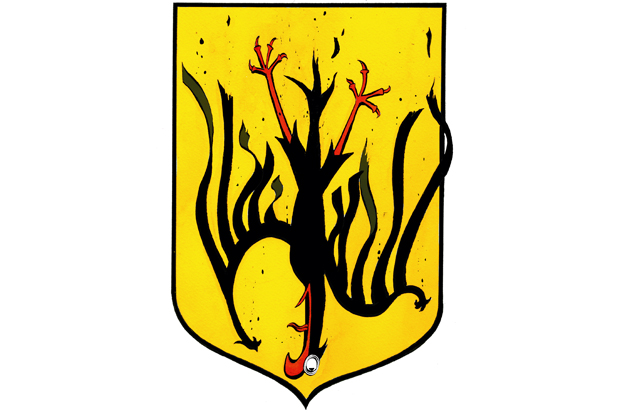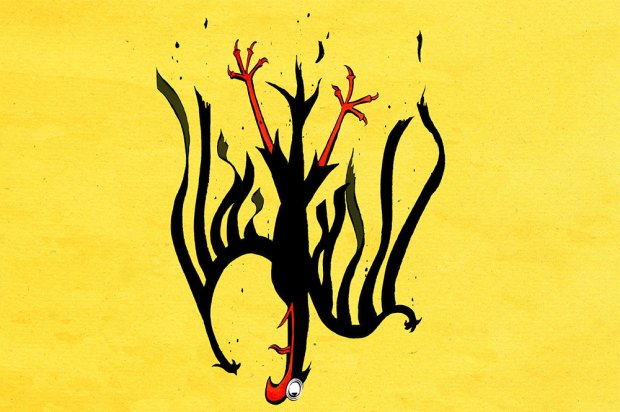As Angela Merkel approaches her tenth anniversary in power, Germans are talking about a possible Kanzlerinnendämmerung — a ‘twilight of the chancellors’. Anger is growing at Merkel’s handling of the migration crisis. Germany, which has only recently reconciled itself to the idea that it is a ‘country of immigration’, must now integrate vast numbers of asylum seekers, beginning with the million who are expected to arrive this year. At the same time, the country has been hit by two huge corruption scandals, involving Volkswagen and the DFB, the German football federation. The odds are that Merkel will survive — it’s hard to see at the moment who can replace her. But the unprecedented challenges she now faces threaten something more fundam-ental: Germany’s post-war identity.
Germans like to believe that they have moved beyond nationhood in the classical sense; that they have developed a post-national identity based on ‘constitutional patriotism’. In other words, Germany has developed a civic (as opposed to ethnic) nationalism based on a liberal political culture and embodied in the Basic Law, the Federal Republic’s constitution.
This identity was in large part informed by a sense of responsibility and contrition for the Nazi past and the Holocaust. As the leading advocate of the idea of ‘constitutional patriotism’, the philosopher Jürgen Habermas, once wrote: ‘In Germany it was only after Auschwitz — and in a sense only because of the shock of this moral catastrophe — that democracy began to take root.’ This implied that there was no sense of national identity available to Germany other than one based on the lessons of 1945.
In reality, German post-war identity is more complex than this account allows. For a long time the embryonic ‘post-nationalism’ that developed in the Federal Republic from the 1960s onwards co-existed uneasily with a rather regressive citizenship law based on the principle of ius sanguinis, or ‘citizenship by blood’, which went back to 1913. Until the law was reformed by Gerhard Schröder’s ‘red-green’ government in 2000, Germany continued to define itself in ethnic terms. Even second- or third-generation Turkish immigrants were officially ‘foreigners’. It has only been during the last decade or so that Germany has come around to the idea that it is a multi-ethnic society — and many Germans are still uneasy about that idea, as shown by the sudden emergence of the anti-immigrant movement Pegida. Germany is post–national more in theory than in practice.
Moreover, from the creation of the Federal Republic onwards, the pride in their country that many citizens felt often came not from the German constitution or from dealing with the Nazi past, but from economic success. In his 2008 book on German myth, Mythen der Deutschen, the political scientist Herfried Münkler wrote that, against the background of the post-war Wirtschaftswunder, or ‘economic miracle’, the Mercedes symbol had replaced the Iron Cross as a symbol of German national pride. Habermas also argued that, in the absence of alternative sources of national identity, a kind of economic nationalism had developed in Germany. For him, however, the symbol of ‘the new confidence of an economically successful nation’ was not automobiles but the Federal Republic’s currency — a phenomenon he called ‘Deutsche mark nationalism’.
Habermas wrote that essay in 1990. Soon after, what he saw as the new symbol of Germany identity was removed by the decision to replace the Deutsche mark with the euro. For a decade, Germany also struggled with the costs of reunifying east and west. But the German economy recovered and has become even more dependent on exports: according to the World Bank, exports grew as a share of GDP from 29 per cent in 1999 to 51 per cent in 2013. Many, including Merkel, refer to Germany as an ‘export nation’ — a term that suggests that exports are central not just to the German economy but also to national identity itself. If Habermas was right that the Deutsche mark had by 1990 become the most important symbol of German national identity, it now seems to have been replaced by exports — what I have called ‘export nationalism’.
While intellectuals identified with the idea of a ‘post-national’ identity or what has even been called a ‘Holocaust identity’, ordinary Germans instead took pride in the extraordinary economic success of the Federal Republic. The tension between these two versions of German post-war identity was expressed most clearly in the statement allegedly made by the Bavarian Christian Democrat leader Franz Josef Strauss, that ‘a people that has achieved the economic success that we have has a right to hear nothing more about Auschwitz’.
In this context, Merkel’s problems take on greater significance. The migration crisis is clearly the biggest and most important. When the scale of the influx of asylum seekers to Germany became apparent in September, Merkel told the German public: ‘We can do it!’
In effect, she was betting on Germany’s post-national identity — to which Germany’s relatively liberal asylum law, based on Article 16 of the Basic Law, has always been central. Merkel has long been perceived as adopting popular Social Democrat or Green policies, particularly on social and environmental issues, as a way of occupying the centre ground of German politics. Her apparent determination to integrate vast numbers of asylum seekers into German society won her new supporters on the left.
However, while Merkel’s supporters see her approach to the migration crisis as bold, her critics — mainly on the right — see it as reckless. There has already been an angry backlash from voters, and that could increase. Since the crisis began, the Eurosceptic and increasingly xenophobic Alternative für Deutschland (AfD), which had seemed to be falling apart after its founder, Bernd Lucke, left to form a new party in July, has been rising in the polls again. Meanwhile attacks on asylum seekers have taken place on an almost daily basis.
The resurgence of the AfD and the increasing frequency of attacks on asylum seekers illustrates how fragile Germany’s sense of identity remains. The Germans who turn up to show that they welcome asylum seekers usually outnumber those on the far right. But the danger remains that, by overreaching in response to the crisis, Merkel may discredit the idea of Germany as an ‘immigration country’ just as ordinary Germans were reconciling themselves to it.
This is also the significance of the football scandal. The 2006 World Cup was the moment when, in the popular imagination, the new multi-ethnic Germany came into being. For many Germans, especially on the left, what became known as the Sommermärchen, or ‘summer fairy tale’ (a play on Heinrich Heine’s 19th-century epic poem Deutschland. Ein Wintermärchen), was an important symbol — in a sense, the moment when the post-national identity became real. But Der Spiegel’s recent allegations that the DFB created a slush fund and paid kickbacks to Fifa officials in order to secure the World Cup have retrospectively tainted that moment. Many Germans now see the Sommermärchen itself as a fairy tale — a Sommermärchenmärchen. A great moment of German pride has been soured.
Meanwhile, the Volkswagen scandal threatens Germany’s identity as an export nation. Over the last decade, Germans have increasingly seen their export–driven economic success as a model for others — indeed, much of the response to the euro crisis has been an attempt to reshape other eurozone economies along German lines. But precisely because automobiles were the symbol of Germany’s Exportstärke, or export strength, the revelations that Volks-wagen cheated on emissions tests in the United States has tainted the success of German exports.
The scandal also broke at a time when other developments, such as the economic slowdown in China, had already illustrated the fragility of Germany’s export-dependent growth model. In short, Germany’s export success looks less sustainable than before.
Despite this series of questions surrounding Germany’s sense of national identity, Merkel is likely to survive for the time being. Much of the criticism of her has come from the right wing of her own party, the Christian Democrats, rather than the Social Democrats, her compliant coalition partner. But it remains hard to imagine the most plausible challenger, the 73-year-old finance minister Wolfgang Schäuble, deposing her. Merkel will probably make further concessions to her right-wing critics, and move on.
However, the extraordinary consensus which centred on Merkel and which has dominated German politics over the last decade seems to be unravelling. That consensus, around a synthesis of centre-right economic policies and centre-left social and environmental policies, was based on the idea of Germany being a country of immigrants, as well as an export nation. As the challenges that Merkel now faces put this sense of identity under increasing pressure, German politics may be about to become more contested and unpredictable, though this may be no bad thing for Europe. When the Merkel era does finally come to an end, it is not at all clear what kind of country she will leave behind.
Got something to add? Join the discussion and comment below.
Get 10 issues for just $10
Subscribe to The Spectator Australia today for the next 10 magazine issues, plus full online access, for just $10.
Hans Kundnani is a senior Transatlantic fellow at the German Marshall Fund, and author of The Paradox of German Power.
You might disagree with half of it, but you’ll enjoy reading all of it. Try your first month for free, then just $2 a week for the remainder of your first year.














Comments
Don't miss out
Join the conversation with other Spectator Australia readers. Subscribe to leave a comment.
SUBSCRIBEAlready a subscriber? Log in